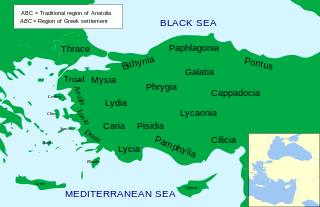Related Research Articles
AD 1 (I) or 1 CE was a common year starting on Saturday or Sunday, a common year starting on Saturday by the proleptic Julian calendar, and a common year starting on Monday by the proleptic Gregorian calendar. It is the epoch year for the Anno Domini (AD) Christian calendar era, and the 1st year of the 1st century and 1st millennium of the Christian or Common Era (CE).
AD 28 (XXVIII) was a leap year starting on Thursday of the Julian calendar. At the time, it was known as the Year of the Consulship of Silanus and Nerva. The denomination AD 28 for this year has been used since the early medieval period, when the Anno Domini calendar era became the prevalent method in Europe for naming years.
Year 166 (CLXVI) was a common year starting on Tuesday of the Julian calendar. At the time, it was known as the Year of the Consulship of Pudens and Pollio. The denomination 166 for this year has been used since the early medieval period, when the Anno Domini calendar era became the prevalent method in Europe for naming years.

Year 251 (CCLI) was a common year starting on Wednesday of the Julian calendar. At the time, in the Roman Empire, it was known as the Year of the Consulship of Traianus and Etruscus. The denomination 251 for this year has been used since the early medieval period, when the Anno Domini calendar era became the prevalent method in Europe for naming years.

Year 247 (CCXLVII) was a common year starting on Friday of the Julian calendar. At the time, it was known as the Year of the Consulship of Philippus and Severus. The denomination 247 for this year has been used since the early medieval period, when the Anno Domini calendar era became the prevalent method in Europe for naming years.
Year 239 (CCXXXIX) was a common year starting on Tuesday of the Julian calendar. At the time, it was known as the Year of the Consulship of Gordianus and Aviola. The denomination 239 for this year has been used since the early medieval period, when the Anno Domini calendar era became the prevalent method in Europe for naming years.

Year 234 (CCXXXIV) was a common year starting on Wednesday of the Julian calendar. At the time, it was known as the Year of the Consulship of Pupienus and Sulla. The denomination 234 for this year has been used since the early medieval period, when the Anno Domini calendar era became the prevalent method in Europe for naming years.

Year 302 (CCCII) was a common year starting on Thursday of the Julian calendar. At the time, it was known as the Year of the Consulship of Constantius and Valerius or, less frequently, year 1055 Ab urbe condita. The denomination 302 for this year has been used since the early medieval period, when the Anno Domini calendar era became the prevalent method in Europe for naming years.

Year 278 (CCLXXVIII) was a common year starting on Tuesday of the Julian calendar. At the time, it was known as the Year of the Consulship of Probus and Lupus. The denomination 278 for this year has been used since the early medieval period, when the Anno Domini calendar era became the prevalent method in Europe for naming years.

Year 263 (CCLXIII) was a common year starting on Thursday of the Julian calendar. At the time, it was known as the Year of the Consulship of Albinus and Dexter. The denomination 263 for this year has been used since the early medieval period, when the Anno Domini calendar era became the prevalent method in Europe for naming years.
Year 190 (CXC) was a common year starting on Thursday of the Julian calendar. At the time, it was known as the Year of the Consulship of Aurelius and Sura. The denomination 190 for this year has been used since the early medieval period, when the Anno Domini calendar era became the prevalent method in Europe for naming years.

Year 193 (CXCIII) was a common year starting on Monday of the Julian calendar. At the time, it was known as the Year of the Consulship of Sosius and Ericius. The denomination 193 for this year has been used since the early medieval period, when the Anno Domini calendar era became the prevalent method in Europe for naming years.
Year 231 (CCXXXI) was a common year starting on Saturday of the Julian calendar. At the time, it was known in Rome as the Year of the Consulship of Claudius and Sallustus. The denomination 231 for this year has been used since the early medieval period, when the Anno Domini calendar era became the prevalent method in Europe for naming years.
Year 177 (CLXXVII) was a common year starting on Tuesday of the Julian calendar. At the time, it was known as the Year of the Consulship of Commodus and Plautius. The denomination 177 for this year has been used since the early medieval period, when the Anno Domini calendar era became the prevalent method in Europe for naming years.
Year 205 (CCV) was a common year starting on Tuesday of the Julian calendar. At the time, it was known as the Year of the Consulship of Aurelius and Geta. The denomination 205 for this year has been used since the early medieval period, when the Anno Domini calendar era became the prevalent method in Europe for naming years.
Year 214 (CCXIV) was a common year starting on Saturday of the Julian calendar. At the time, it was known as the Year of the Consulship of Messalla and Suetrius. The denomination 214 for this year has been used since the early medieval period, when the Anno Domini calendar era became the prevalent method in Europe for naming years.

Year 1 BC was a common year starting on Friday or Saturday in the Julian calendar and a leap year starting on Thursday in the proleptic Julian calendar. It was also a leap year starting on Saturday in the Proleptic Gregorian calendar. At the time, it was known as the Year of the Consulship of Lentulus and Piso. The denomination 1 BC for this year has been used since the early medieval period when the Anno Domini calendar era became the prevalent method in Europe for naming years. The following year is AD 1 in the widely used Julian calendar and the proleptic Gregorian calendar, which both do not have a "year zero".

Year 221 (CCXXI) was a common year starting on Monday of the Julian calendar. At the time, it was known as the Year of the Consulship of Gratus and Vitellius. The denomination 221 for this year has been used since the early medieval period, when the Anno Domini calendar era became the prevalent method in Europe for naming years.
Year 223 (CCXXIII) was a common year starting on Wednesday of the Julian calendar. At the time, it was known as the Year of the Consulship of Maximus and Aelianus. The denomination 223 for this year has been used since the early medieval period, when the Anno Domini calendar era became the prevalent method in Europe for naming years.
Year 228 (CCXXVIII) was a leap year starting on Tuesday of the Julian calendar. At the time, it was known as the Year of the Consulship of Modestus and Maecius. The denomination 228 for this year has been used since the early medieval period, when the Anno Domini calendar era became the prevalent method in Europe for naming years.
References
- ↑ Alan K. Bowman; Peter Garnsey; Averil Cameron, eds. (2008). The Cambridge ancient history. Vol. 12, The crisis of empire, A.D. 193-337 (2nd ed.). Cambridge: Cambridge University Press. p. 37. ISBN 978-1-139-05392-1. OCLC 457145065.
- ↑ Catholic Encyclopedia: Councils of Arabia